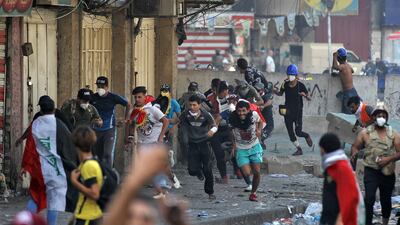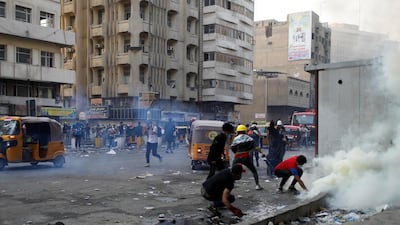The top US diplomat in the Middle East on Wednesday called on the Iraqi government to crack down on Iran-backed militias and hold them accountable for the disappearances and assassinations of Iraqi human rights and civil society activists as Prime Minister Mustafa Al Kadhimi prepares to visit Washington this month.
“We’re also talking at every chance that we can with the Iraqi government about their requirement, about their moral duty to protect peaceful protesters and civil society activists,” said Joey Hood, acting assistant secretary of state for Near Eastern affairs
“We have no doubt that anti-democratic armed militia groups are behind these cowardly acts, and targeting of human rights and democracy advocates has to end. And we’re going to bear witness to this. And we’re going to encourage the Iraqi government to take on those militias until we do and bring them to justice.”
Speaking at a panel on Iraq hosted by the Washington Institute for Near East Policy, Mr Hood noted that last week marked the anniversary of the assassination of Hisham Al Hashimi, an Iraqi expert on extremist groups who was gunned down in Baghdad.
The Iran-backed militia Kataib Hezbollah is widely believed to be behind Al Hashimi’s assassination.
“We continue to call on the Iraqi government to bring those responsible for his murder to justice, as well as those responsible for the killing of Ihab Al Wazni and the disappearance and killing of hundreds of other protesters and civil society activists,” Mr Hood said.
Ihab Al Wazni, who was assassinated in May, was a leader in Iraq’s popular anti-government protest movement and a critic of Iran.
Al Wazni’s assassination added further fuel to the protests, which began in 2019 over deteriorating economic conditions and continuing electricity shortages. After thousands rallied to protest his death in Baghdad, Iran-backed militias shot at and beat the demonstrators, killing one and injuring dozens of others.
Mr Hood called on the Iran-backed militias to cease violence against the Iraqi people and end attacks on US forces stationed throughout Iraq.
“We want them to leave us alone and leave the Iraqi people alone,” said Mr Hood. “The more time we spend dodging rocket attacks and having to defend ourselves, which we will do, then the less time we can devote to all these other issues that are very, very important, like saving lives from Covid.”
US President Joe Biden’s latest round of air strikes last month on Iran-backed militias — carried out in response to a drone attack on the US consulate in Erbil — prompted further attacks on US forces by armed groups.
The spate of violence between the US and the militias will feature highly on the agenda when Mr Al Kadhimi arrives in Washington this month for the latest strategic dialogue between the two countries.
This will be Mr Al Kadhimi’s first visit to Washington since Mr Biden took office.
The prime minister is under intense pressure from the Iran-backed militias, as well as the Sadrist movement, to expel US forces from Iraq.
Washington and Baghdad began a series of strategic dialogues last year to hammer out the future role of US forces in Iraq after the Iraqi Parliament took a symbolic, non-binding vote to expel American troops after the killing of Iranian Quds Force leader Maj Gen Qassem Suleimani and Popular Mobilisation Forces commander Abu Madhi Al Muhandis.
“These meetings are about expanding our bilateral relationship,” said Mr Hood. “But of course, if the militias get their way, all of the media attention is going to focus on those one or two sentences in the joint communique talking about our joint security co-operation relationship.
“Don’t fall into that trap. Focus on everything else that we’re doing or should be doing to grow this bilateral relationship.”
Part of the lengthy communique issued after the latest round of US-Iraq strategic dialogues in April hinted at the withdrawal of American combat troops from Iraq.
However, that agreement is unlikely to significantly alter the US force posture in Iraq as the vast majority of the 2,500 American troops stationed there remain in an advisory capacity as part of the campaign to defeat the remnants of ISIS.
















